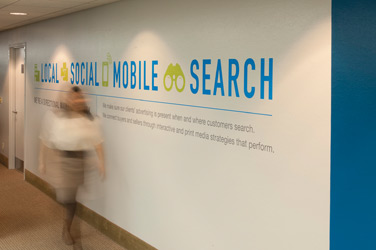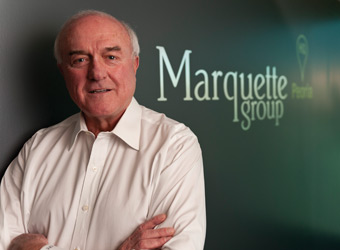
Eric Webb is president and co-owner of Marquette Group, headquartered in Peoria and often described as central Illinois’ best-kept secret. Since becoming president, Webb has led its transition from a Yellow Pages agency to an integrated advertising firm delivering directional marketing solutions to a variety of industries. Among the firm’s high-profile clients are Enterprise Rent-a-Car, CVS, FedEx, Bank of America, Pizza Hut, Sherwin Williams, U-Haul, Edward Jones and H&R Block.
Describe your own career path. How did you get started in the marketing world?
Before joining Marquette Group in 2002, I spent eight years with the Reynolds & Reynolds Company, a leading provider of data and technology solutions for the automotive industry. In my last role at Reynolds, I worked with General Motors on a variety of initiatives, with several geared toward marketing new services GM and their dealers were launching. Perhaps this is where the real marketing interest came from.
I joined Marquette Group to work with CEO Chris Cummings, which we spoke about for years and decided to make a reality. So, I came to Marquette Group for a sales role as business development manager and later moved into an executive VP role. Since becoming president, I’ve led Marquette Group’s transition from a Yellow Pages agency to an integrated advertising firm delivering directional marketing solutions. I provide executive leadership of business development, account management, marketing and interactive solutions across all Marquette Group offices. Since 2007, I have also served as president of Marquette Group’s sister company, USMotivation.
The best part of my job is the passion and energy I get by working with talented employees and wonderful clients ensuring “success,” which can be defined in many ways but often is a result of growth. Personal or professional, within the family, or in our company or in those of our clients and partners, it is tremendously gratifying to realize achievement. Tell us about the purchase of the Yellow Pages division of the Charles Ruppman Agency and the birth of Marquette Group.
Tell us about the purchase of the Yellow Pages division of the Charles Ruppman Agency and the birth of Marquette Group.
Marquette Group was founded in 1963 in Peoria by Charles Ruppman, Sr. as the Charles Ruppman Agency. With a team of only 26 employees, Ruppman earned annual revenue of $1.3 million the first year in business—$300,000 of which was attributed to the Yellow Pages product. Ruppman Agency’s first and most prestigious client was one of the largest insurance companies in the nation. Hundreds of others also made Ruppman their strategic partner over the next four decades.
In May 1996, current CEO and co-owner Chris Cummings purchased the Yellow Pages division from Ruppman. Soon, the company reinvented itself as Marquette Group and embraced the new advertising opportunities available through digital technology and the Internet, expanding its scope of service.
In 2004, Marquette Group purchased USMotivation, an incentive awards and event management company located in Atlanta, Georgia. This provided the opportunity to really differentiate the company with a new line of business that serves a very similar clientele as Marquette Group. Through both organizations, we deliver tremendous value in helping our clients grow: through the advertising services of Marquette Group that pull customers to our clients, and the incentive services of USMotivation that help push employees of their clients to achieve growth and other business objectives.
In 2008, the company opened a Toronto-based Canadian division of Marquette Group focused on directional media and response measurement services that generates qualified, measurable leads for advertisers. Less than a year later, in February 2009, we further supported the Canadian growth plan by acquiring a Montreal-based directional marketing services company.
In 2011, we acquired select assets from one of our former competitors when the company dissolved. These assets included Atlanta, Toronto, Memphis and St. Louis offices and clients and brought key members of the executive, client services and operations teams to the Marquette family.
Marquette Group has been described as central Illinois’ best-kept secret. Why do you think this is the case?
We are headquartered in Peoria, with full-service locations in St. Louis, Atlanta, Toronto and Montreal. Being headquartered in central Illinois provides us with dedicated employees who bring true Midwestern values to the job and admirably serve our clients every day. We have over 200 employees across the company, with about 145 in the Peoria office.
The reality is that few really know much about Marquette Group unless we are being sought. However, everyone knows the large national advertisers we represent—Pizza Hut, Roto-Rooter, Edward Jones and so on. These brands utilize distributive outlets (agents, dealers, franchisees) to market and sell their products. As more brand managers recognize the importance of the local consumer, we aggregate the local lead generation process on behalf of our national clients.
We connect qualified, local customers to these national brands through integrated media strategies. Our media planning strategy helps clients find the sweet spot where their business goals intersect with customer intentions and blends the strengths of multiple media channels to create a fully integrated media plan. Marquette Group optimizes, distributes and tracks clients’ content and advertising across local search engines, social platforms, mobile devices and print and online directories to ensure customers connect with them no matter how they search. Across all of our products and services, we are committed to testing and measuring calls and clicks to make sure our clients are receiving the return they expect through our best-in-class response measurement service.
Describe how you work at the local level to drive leads. How do you ensure that leads are highly qualified?
Our point of view, and the way we apply this view to our practices, is how we drive highly qualified leads. We know that each market has its own unique DNA, and we study it at a granular level using best-in-class data. We look at demographics, consumer buying patterns and evolving media choices. By combining our intelligence with our clients’ budget and ROI requirements, we develop media plans that maximize each advertising dollar they spend.
Fortunately, all media we represent can be measured directly. Once we create a tailored media plan and launch the campaign, we begin our continuous improvement process by conducting ongoing variable testing and response measurement to identify trends and set benchmarks. We leverage the results of our continuous testing to deliver evidence-based recommendations for campaign enhancements. After implementing the enhancements, we continue the testing cycle.
How has the recent economic downturn impacted your industry and Marquette Group in particular?
Like many businesses, the recent economic situation has required us to take a close look at our business while ensuring that we continue to focus on our employees and our clients. We did see a dip in revenue and profits, but not nearly like many others. In lieu of layoffs, we adjusted expectations with lower budgeted profits, knowing that we would see a turnaround. We felt it was more important to sacrifice some profit in order to keep the “contract” (so to speak) with our employees, who were there in the good times as well. Fortunately, things have turned around and we continue to see growth.
Outside of the economy, the Yellow Pages industry is certainly under pressure, given the many other advertising alternatives and new solutions that continue to escalate the complexity for many marketers. There have certainly been reductions in investment in Yellow Pages advertising, but to what degree is very industry-specific.
For years, we were keenly aware that the advertising industry was going to evolve and we have been aptly prepared for the change. We were early adopters in the digital space and continue to advance in the ever-changing interactive advertising marketplace. Regardless, we understand our advertisers’ businesses and where to place their investments in order for them to reach as many consumers as possible. Then, we effectively evaluate the performance of our recommendations to ensure the absolute best return on their investment possible…regardless of the media options—print or online.  How has the Yellow Pages made the leap into the digital world? In 2012, how significant does it remain as a marketing tool?
How has the Yellow Pages made the leap into the digital world? In 2012, how significant does it remain as a marketing tool?
Yellow Pages was the original search engine, but in a print format. The knowledge and experience from successfully implementing and managing Yellow Pages campaigns for our clients has made the transition into digital natural for us. When we were solely running print Yellow Pages campaigns for our clients, we studied each local market and implemented strategies that drove local leads for national brands. Today, we do the same for our digital solutions, with the intent to drive traffic at the local level for our clients.
The term “Yellow Pages” no longer solely refers to the traditional printed phone book. Instead, it now refers to a broad suite of products that includes mobile phone apps, Internet Yellow Pages websites and printed directories. In fact, Internet Yellow Pages (IYP) receives 5.6 billion references annually. Back in 1997, we placed some of the first IYP ads in the marketplace, and today, we are one of the largest purchasers of IYP advertising in the nation.
Yellow Pages remains an important marketing tool as it connects businesses with consumers at the moment they are ready to make their purchase. Consumers don’t go to the Yellow Pages to casually browse listings—they’re seeking a provider of a product or a service. As such, 78 percent of consumers who go to the phonebook end up making a purchase. One third of those purchases are from consumers who are new to the business they contact. All of the Yellow Pages products really are unique, as no other media so specifically targets consumers at the end of the buying cycle.
Research shows that Yellow Pages is still the most trusted source of local information, ahead of search engines and social networks. It's also regarded as the most accurate source of local business information. Forty-five percent of consumers prefer Yellow Pages products over search engines when trying to find a business address or
phone number.
It is estimated that Yellow Pages influences between $413 billion and $1.03 trillion of U.S. commerce. This means that Yellow Pages influences about five percent of gross domestic product and 6.6 percent of personal consumer expenditures.  It seems that everyone is an expert on social media, mobile marketing and search engine optimization these days. What makes your solutions unique?
It seems that everyone is an expert on social media, mobile marketing and search engine optimization these days. What makes your solutions unique?
Because of the low barrier to entry on many of these products (e.g., it’s free to set up a Facebook page), anyone is allowed to participate and try to build credibility as an industry expert. However, most of these “experts” do not have hands-on experience trying to turn these strategies into positive financial results in the form of leads, calls or sales. We look at all of our campaigns agnostically: Are they generating sufficient return compared to other available options? Marquette's unique approach of tying all of our campaigns to client ROI metrics ensures that whatever solutions or tactics we use are measured for effectiveness and value.
How have tools for measuring ROI improved over the last 5-10 years? What are the challenges that remain in comparing return across different types of media?
Marquette Group has been testing advertising for over 20 years. We want to provide our clients the wisdom they need to make evidence-based decisions. We implement response measurement solutions for the marketing solutions that we represent, but we do so for many other forms of advertising that may not be part of our portfolio.
Not only do we measure call tracking and clicks, but we also look at cost-per-customer or acquisition and even work with our clients’ proprietary data to analyze what “conversion” means to them to help them meet their goals. By doing so, we can provide a true reflection of what is working to help marketers stay away from emotional buying decisions and allow them to make investment decisions with facts.
Demonstrating consumer purchasing behavior is quite easy with many forms of directional marketing using phone calls, clicks, QR codes, etc. However, it becomes more difficult when an advertiser really wants to understand the impact of branding initiatives that may not generate a true call to action. That said, calls to action and then sales conversions are really what marketers need, and that is very measurable, so long as you have the right technology in place and are able to properly perform the much-needed analysis.
You have been on a merger-and-acquisitions kick over the last 3-4 years. How has this driven growth for the company? What led you to Canada as a growth market?
Our primary focus for growth is through traditional business development activity—attracting the right clients, who are well suited for Marquette Group’s portfolio of solutions, and allow us to work hard at serving them effectively. We have supplemented this organic growth with a few acquisitions. Strategically, we want to continue building a fantastic portfolio of brands that do a great job of serving their clients in a decentralized or distributive manner at a “local level,” where such transactions occur.
Our ability to offer a strong portfolio of advertising services to a brand’s headquarters and throughout their locations stretching across all of North America makes us rather unique. Many agencies just want to focus on corporate headquarters and don’t have the ability to go local. Meanwhile, taking national brands down to the local level where sales happen is a strength at Marquette Group. As we grow with these brands, many of the new advertising solutions are seeking distribution partners to connect to these advertisers. We feel we are perfectly suited to be such a partner, given the company we keep as a client portfolio. More importantly, we can then provide the right advertising solutions (new or traditional) to our clients and help solve the complexity of advertising in today’s fragmented world.
Of all the technological changes in your industry over the last decade, what are you most surprised about?
The speed at which it changes is amazing. Therefore, new advertising solutions appear routinely, and even more remarkable is the sheer number of places where a client’s ad can exist. It can certainly be a challenging venture, and one that doesn’t come with an endless supply of money, so marketers have to be savvy so they can get the most effective return for their investment. Advertisers cannot simply chase the newest slick advertising option; they must diligently use a very evidence-based approach to driving leads for their business.
Marquette Group has won numerous awards for being a great place to work. What are the key aspects of your company culture that led to such recognition?
We are a family at Marquette Group. Our employees are very important to the success of what we do, and we like to offer them a place where they can grow professionally and personally. We offer various programs to encourage work-life balance. Flex schedules give each employee an opportunity to choose a start time per quarter. They can start anywhere from 7 to 8:30am. We also offer employees the ability to purchase up to one week of vacation, and that’s in addition to their traditional company-paid vacation. Our benefits package is very competitive, and every year we re-evaluate to make sure our employees are getting the best pricing and coverage. Our employees also benefit from profit sharing based on the company’s performance each year.
We value the feedback from our employees, and that’s why every year we conduct an employee satisfaction survey that management dissects and uses to help create strategies and programs for the following year. Transparency is also important and part of our culture. We believe in full, accurate and timely disclosure of strategic and tactical information for employees to better serve our clients.
Community outreach is also important to us. Throughout the year, we participate in various fundraisers for organizations. Each year, we also have a group that participates in the Race for the Cure.
What do you see in the future for Marquette Group?
Simply stated, Marquette Group will continue to evolve as an agency. We discuss “change” all the time. We are accustomed to seeing what is in front of us and altering our business approach to meet the demands of our clients.
We know our revenues tied to print Yellow Pages will decline. We also know that the digital side of our business will continue to grow. Therefore, we must continue to effectively help our clients manage the myriad of advertising options that are available through a very evidence-based approach. By doing so, the passionate employees of Marquette Group will continue to execute our vision—bring wisdom to those who make decisions regarding lead generation. And our return will be growth—growth for our clients, growth for our employees and growth for their company. iBi

